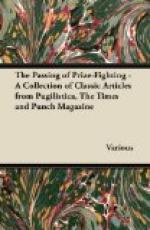Mr. MACCALLUM SCOTT’S colossal intellect, like the elephant’s trunk, can grapple with the most minute objects. Yesterday it was the shortage of sausage-skins; this afternoon it was the grievance of Scottish bee-keepers, who are deprived of sugar for their charges, and compelled to put up with medicated candy at twice the price. In spite of the FOOD CONTROLLER, I understand that MR. SCOTT has no intention of parting with the very promising swarm that he carries in his national headgear.
Wednesday, February 28th.—Mr. WATT was seized with a bright idea this afternoon. The CHIEF SECRETARY FOR IRELAND had explained to Mr. GINNELL, that certain men had been convicted of having attempted to cause disaffection by singing disloyal songs. “Will the right hon. and learned gentleman give the House a sample?” interjected Mr. WATT. The notion of Mr. DUKE, vir pietate gravis, if ever there was one, indulging in ribald melody, caused much laughter, which was increased when the right hon. gentleman in his most portentous manner implied that his only reason for not granting the request was fear that the SPEAKER might intervene.
[Illustration: SIR FREDERICK BANBURY AND COLONEL MARK LOCKWOOD CONSULT THE WATER LIST.]
A brief recrudescence of the MEUX-CHURCHILL duel was not much to the taste of the House, which is evidently of opinion that LORD FISHER might now be left alone both by foes and by friends. Members were glad to seek solace in the drink question, and gave a sympathetic hearing to the proposal of Mr. WING that they should voluntarily submit to the same restricted hours of consumption as they had imposed on the outside world. Mr. WING is a temperance reformer, but on this occasion he had the redoubtable assistance of Mr. GEORGE FABER, a stout friend of the “trade” whose hair had grown white, he declared (though in other respects he still looks delightfully juvenile), in fighting the Licensing Bill of 1908. In his opinion the House could no longer keep itself in a compartment apart—especially as it was not a watertight compartment. Sir FREDERICK BANBURY, who is naturally a champion of cakes—and ale—made a despairing effort to preserve the privileges of the Palace of Westminster, but did not carry his protest to a division; and after a few valedictory remarks from Colonel LOCKWOOD, including two quotations from LUCRETIUS (derived from a crib, as he modestly explained), the House unanimously decided that its habits should be in conformity with its debates—dry with moist intervals.
Thursday, March 1st.—Copies of the unexpurgated edition of the Report of the Dardanelles Commission marked “confidential” are to be sent to the SPEAKER and to the leader of every political party in the House. If Mr. BONAR LAW thought by this announcement to allay curiosity he was disappointed. Requests for a definition of the term “political party” rained upon him from all quarters. It really is a rather nice




